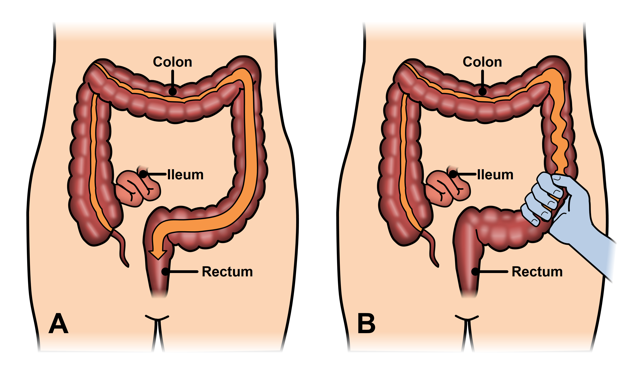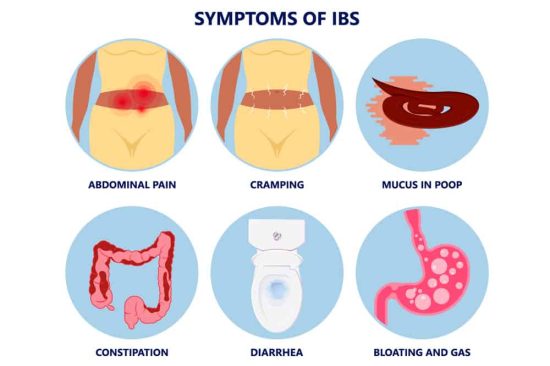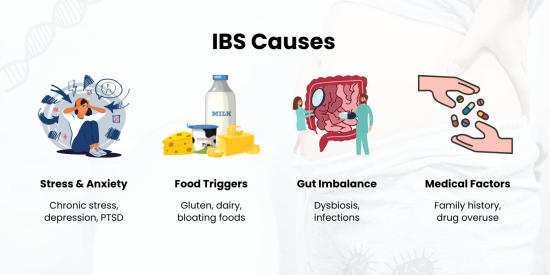
Best Homeopathic Medicine for IBS
Constipation, diarrhea, bloating, and abdominal pain are all symptoms of the common digestive issue known as Irritable Bowel Syndrome (IBS). It interferes with day-to-day activities and frequently develops into a chronic issue. The goals of homeopathic treatment for IBS are to naturally improve gut health, alleviate symptoms, and address the underlying cause. The definition of IBS, its symptoms, causes, prevention advice, diagnosis procedure, and the safe and efficient use of homeopathy are all covered in this blog.
What is IBS?
Irritable Bowel Syndrome (IBS) is a long-term condition that affects how the large intestine works. Although it doesn’t harm the gut permanently, it can result in unpleasant symptoms like constipation, bloating, diarrhea, and stomach cramps. Because it affects the digestive system’s operation rather than its structure, IBS is referred to as a “functional” bowel disorder. It can interfere with everyday life and emotional health, but it is not life-threatening. Effective symptom management is possible with the correct strategy, which includes using homeopathic medicine for IBS.

Symptoms of IBS
The symptoms of IBS can differ from person to person and may come and go over time. They often get worse after eating certain foods or during periods of stress. Common symptoms include:
- Abdominal pain or cramping – Usually improves after passing stool
- Bloating and gas – Feeling of fullness or swelling in the stomach
- Diarrhoea – Frequent, loose, or watery stools
- Constipation – Trouble passing stools or having fewer bowel movements than usual is known as constipation.
- Alternating diarrhoea and constipation – Switching between both conditions
- Mucus in stool – A White or clear substance present in bowel movements
- Urgency to pass stool – Sudden, strong need to use the toilet

Causes of IBS
The reasons why people develop IBS are not completely understood yet; it is commonly thought to be caused by a combination of several factors that affect the daily function of the gut in individuals with IBS.
- Irregular contractions of the muscles of the intestine – Intestinal contractions may be stronger than normal, and cause diarrhea, or weaker than normal, and cause constipation, or both.
- Increased sensitivity of the gut – Nerves in the digestive tract may become sensitized, and build toward pain when healthy gut function generally does not cause pain.
- Food intolerances – Foods that can aggravate symptoms in practical situations may be dairy, gluten, caffeine, or even fatty meals.
- Stress and emotional features – Anxiety, depression, or emotional stress could produce more gut symptoms than normal.
- Hormonal changes – Most women can identify that they feel IBD symptoms more frequently during their menstrual cycle due to the changing and cyclical nature of gut health.

Homeopathic Medicine for IBS
Homeopathy takes a gentle and holistic approach to the management of Irritable Bowel Syndrome (IBS). While conventional treatments may simply provide temporary relief from irritating symptoms, homeopathic remedies for IBS work on the root cause by understanding a person’s physical symptoms, emotional health, and lifestyle habits. Remedies are prescribed individually for each patient, making the treatment personalised, safe, and suitable for long-term use without side effects.
Commonly used homeopathic medicines for IBS include:
- Nux Vomica – good for constipation, bloating, and indigestion related to stress, overwork, and eating habits that aren’t structured.
- Colocynthis – which helps for acute abdominal cramps that improve when bending forward or applying pressure to the abdomen.
- Lycopodium – Good for bloating, excess gas, and discomfort that gets worse in the evening
- Argentum Nitricum – good for diarrhoea associated with anxiety, nervousness, or anticipation.
- Sulphur – a good treatment for alternation between constipation and diarrhea, and typically causes a burning sensation in the stomach.

Disclaimer:
The content of this blog is purely for educational purposes and should not be used as a substitute for professional medical advice, diagnosis, or treatment. IBS symptoms will differ for everyone, and self-medication may not be safe or effective. It is always best to consult a qualified healthcare professional or a registered homeopathy doctor before starting any treatment.
How to Diagnose IBS?
There is no single test to confirm Irritable Bowel Syndrome. Doctors usually diagnose it by reviewing symptoms, checking medical history, and ruling out other digestive problems. A healthcare professional may ask you to do the following:
Medical history review – Where you will discuss your symptoms, diet, lifestyle, and any related health issues.
Physical examination – The healthcare professional will feel your stomach for signs of tenderness or bloating.
Blood tests – To rule out infections, anemia, or other conditions.
Stool tests – To check for parasites, infection, or signs of inflammation.
Colonoscopy or sigmoidoscopy – This may be requested if you have severe symptoms or if there is a need to rule out serious bowel diseases.
Prevention of IBS
After all, even though Irritable Bowel Syndrome cannot always be prevented, making certain lifestyle changes can help limit chances of flare-ups and manage symptoms:
- Eat a balanced diet – The best approach is to include fresh fruits, vegetables, and whole grains, while avoiding processed foods and anything oily.
- Identify trigger foods – Keep a record of the foods you eat each day to identify which foods may worsen your symptoms, such as caffeine, dairy, or spicy food.
- Stay hydrated – Drink plenty of water every day to help keep your digestion healthy.
- Manage your stress levels – Use breathing techniques, meditation, or yoga to help reduce flare-ups from anxiety.
- Exercise – Regular physical activity can help your bowel movements and keep your gut healthy.
- Eat smaller, more frequent meals – Eating smaller meals reduces strain on your digestive system, which can help limit bloating.
These habits will not only support your digestive health but also help you maintain your health in general!
Consult with Dr. Deepika Homeopathy
Dr. Deepika is an experienced homeopathy doctor who specializes in chronic digestive disorders, especially IBS. Along with offering patient-centered consultations, she uses her wealth of knowledge on holistic healing to select the most appropriate remedy and also offer lifestyle advice to guarantee a continuous, longer relief that does not require taking medication, which has side effects.